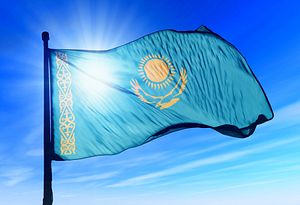At least 10 people are dead in the northwestern Kazakhstan city of Aktobe after a pair of apparent gun-store robberies and an assault on a military facility. Almas Sadubayev, a spokesman for the Interior Ministry, said the attackers were “followers of radical, non-traditional religious movements.”
On June 5, violence broke out in Aktobe, a prominent oil town about 100 kilometers from the Russian border. According to the Astana Times, citing Sadubayev, the first gun store was attacked at 2:45 pm local time. An hour later a second gun shop was attacked and another group of attackers assaulted a National Guard facility.
A clerk and a security guard were killed at the first gun store, where three policemen were also wounded. At the second store, a customer was reportedly killed before police shot three of the attackers dead. The attackers stole a commuter bus, offloaded the driver and passengers, and then rammed it into the gates of an National Guard base. Three servicemembers were killed along with one attacker. Reportedly seven of the attackers were detained.
Overnight, the Kazakh authorities say, five more attackers were killed and two more detained.
The attacks prompted the authorities to declare a high alert in the city, which has a population of about 400,000. According to Al-Jazeera English, one Aktobe resident said he received a text message announcing a 10 pm curfew. Tengrinews reported that police cleared people from malls and markets and the city suspended public transportation. In addition, reports indicated that the city also shut down access to the Internet, through mobile networks were reportedly still available. A handful of videos have leaked showing snippets of the attacks but piecing together a coherent narrative regarding what happened will be difficult.
A Kazakh news website has published what it says are the identity of the attackers. Meanwhile, a report on TASS cites the Kazakh Health Ministry as claiming that nearly 40 people were wounded “in Sunday’s extremists’ attacks.”
As noted above, the authorities have used the phrase “followers of radical, non-traditional religious movements” to describe the attackers. The euphemism–a way of saying “Islamic extremists” without actually saying “Islamic extremists”–is vague, to say the least. According to the Astana Times, Erlan Karin, director of Kazakhstan’s Institute of Strategic Studies, “said the attack may have been organized by a local radical sleeper cell whose members could have been inspired by ISIS internet videos.”
As EurasiaNet commented, “No group has come forward to claim responsibility for the events and the radical Islamic link has been made only by the authorities.”
In the days ahead, these will be the core questions: Who were the attackers? How were they organized? What were their aims? Answers to these questions are already being floated, but picking fact from fiction will be increasingly difficult. EurasiaNet has a valuable rundown of past violence incidents in the Aktobe region, noting in particular the tendency of the Kazakh authorities to cast groups like those that engaged in the recent attacks as criminals “sheltering behind the guise of religion.”
Unfortunately, as with other flashes of violence across Central Asia, we’re unlikely to get a satisfactorily firm answer about what happened.

































